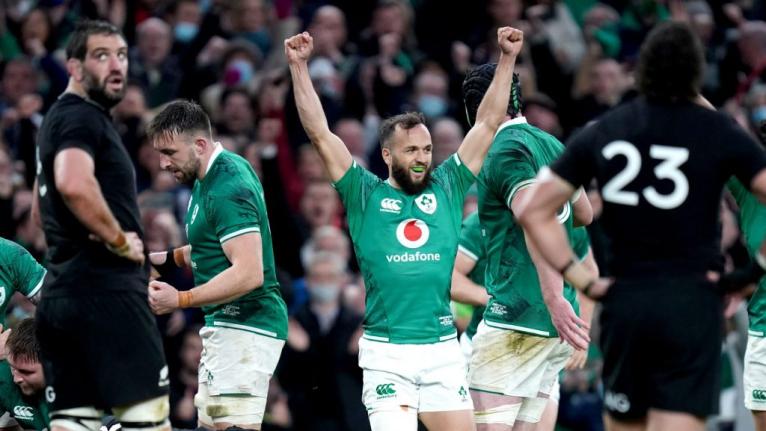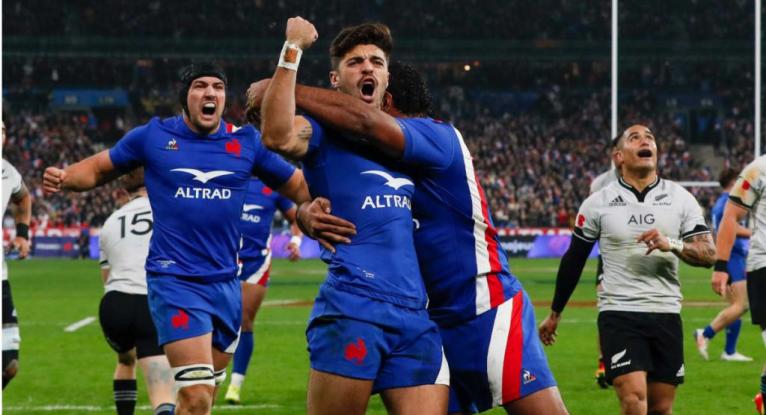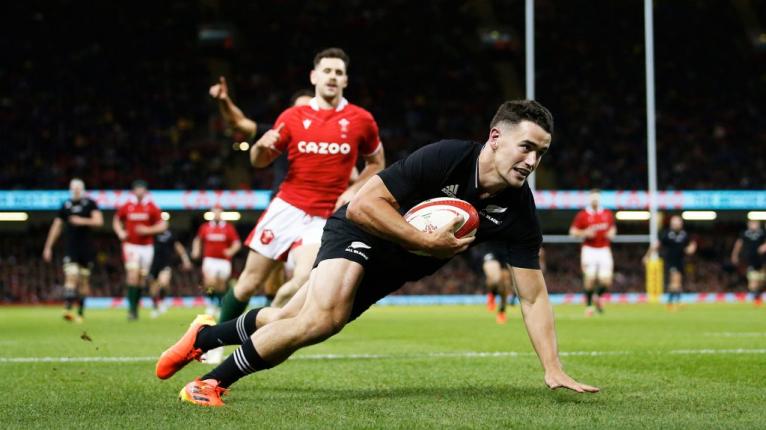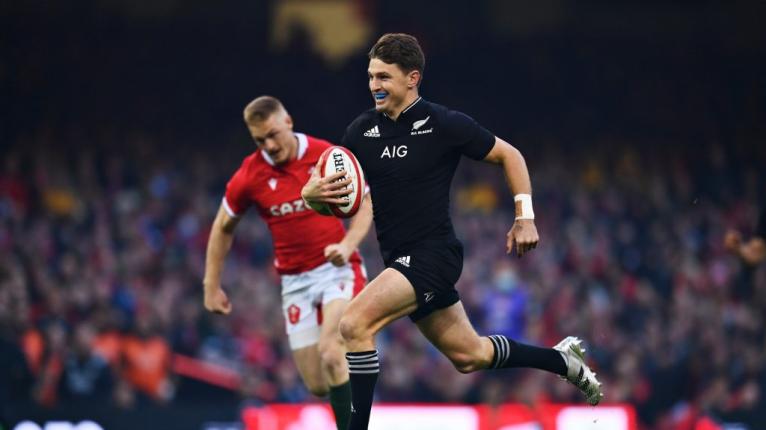“Mate, it’s a bit philosophical, but a lobster only grows by going to the bottom of the ocean and shedding its shell. It has got to make itself utterly vulnerable to having its life taken to be able to grow. Otherwise its soft belly’s going against the shell and it can’t get out.”
It’s not the kind of thing you’re accustomed to hearing during a rugby chat, but when your co-conversationalist is New Zealand assistant coach Brad Mooar, quotes like this are by no means jarring. Delivered in a laconic Canterbury brogue and accompanied by a broad smile, Mooar’s philosophical asides come from a place of conviction. They underline his status as one of rugby’s deep thinkers.
The lobster in this analogy represents the All Blacks. Rugby’s most successful side ever recently returned from a three-month tour that ended in consecutive defeats. It’s only the second time in a decade that New Zealand have lost two Tests in a row and it has led to hysteria in sections of the local media and their demanding fan base. Defeats by Ireland and France made it technically their worst season since 2009 and have heaped pressure on the shoulders of head coach Ian Foster.

It’s apparent speaking to Mooar that the pain of those losses remains raw but he insists “those moments of being uncomfortable are great moments for growth”. It’s the kind of response you’d expect from an infectious optimist whose metaphorical glass is always overflowing. He led the Scarlets during a difficult period, taking over from Wayne Pivac when the 2017 Pro12-winning side had slid into something of a trough.
Through a combination of strong leadership, magnetism and no little charm, he soon won over the players and their fans. Even in defeat, he possessed a rare ability to disarm the most truculent reporters, persuading them, with a Jedi-like authority, that the trajectory was travelling inexorably upwards. Those qualities will undoubtedly prove useful at a time when the All Blacks need to quell the sense of panic among their restless supporters.
The entire touring party had to isolate in a quarantine hotel on their return, which offered plenty of opportunity for quiet contemplation. Mooar, though, had other plans. As a trustee of a cancer charity formed by his friend Chalky Carr before his untimely death, Mooar was determined to use the time constructively. He, along with two friends connected via Zoom, cycled in his room for 24 consecutive hours to raise money for the trust. It was, he says, “the hardest thing I’ve ever done”. Starting at 7pm on a Thursday night, Mooar powered through until 7pm on Friday, stopping only “to have a pee every now and again, or to make a coffee and change my shoes”. By the end, as he was limping towards the finish line, his purpose-built bike shoes had been replaced by a pair of flip-flops.
The enterprise – torturous as it was – gave him some much-needed perspective. “You’ve got to work out what you’re grateful for,” he says. “After you’ve come off a couple losses in the northern hemisphere and the world’s at you, saying you’re no good any more, you think, ‘Right ho – let’s get into something here’. And it was incredible – apart from the six hours I was in a deep mental hole from around 8am to 1pm on Friday!” Those five hours, he recalls, were “horrific”. “My mind was thinking, ‘We’re halfway’, and then I realised we had to keep going until 7pm. I think I stuffed my nutrition up… whether I ate too much or too little I’m not sure, but it gets you half an hour or so later. But we all just helped each other out and it was brilliant,” he says.
There’s an expectation before every game that we go out to win it – and not just win it, but win it well. But to be honest, it’s a privilege to carry that obligation. You know it when you take on the job.
Brad Mooar
Among those helping out were Olympic gold medallists Eric Murray and Hamish Bond, both of whom logged on and bashed out some miles in solidarity and support. Their presence, along with hundreds of members of the public, proved a welcome distraction. “We talked about all sorts. The brain can take you to funny places when you’ve stayed up for 24 hours,” he says. “We talked about training and the importance of nutrition. To ‘iron people’, it’s their fourth discipline, so learning about that was massive; what sort of numbers they were pushing, how they measured their training. The mental strength to be able to take your body to those extremes at all times is insane. If you said to me, ‘Mate, you’re going to get back on the bike in a week’s time and do another 24 hours’, I’d tell you to sling your hook.”
As physically demanding as it was, it’s the mental reward that Mooar is now savouring. The experience allowed him to reset psychologically before considering what had happened on tour. “You come off the back of those two losses and your head’s probably not in a great space, but then you do that and realise that there are bigger things in life,” he says.
Mooar is at pains to point out that he’s not in the business of making excuses, but he is adept at putting a few defeats on the rugby field into perspective. “I’m pretty philosophical anyway but you when know you’re hurting and you’re away from home and everything that goes with it, at the same time you know you’re on a journey to get better. It’s uncomfortable at the moment but then you go and do something like that and listen to someone with bowel cancer and you think, ‘OK we’re really hurting here but the people that had cancer when I started on this bike will wake up tomorrow and they’ve still got cancer’. You know, I wake up and I’ll get into work. There’s no drama.”

That said, there was no shortage of drama on the field, not least during the France match in Paris, which was a compelling tapestry of twists and turns from the first moment to the last. For too long, France have been mired in mediocrity. That this French side have recaptured the spirt and elan of their free-running forebears is a source of pleasure to most neutral fans, but it was of little succour to the New Zealand coaches as they saw their team slide to another damaging defeat.
Given how success-starved Les Bleus have been, Fabien Galthié has enjoyed a honeymoon period rarely afforded to his contemporaries in the All Blacks job, an observation not lost on Mooar. “There’s an expectation before every game that we go out to win it – and not just win it, but win it well,” he says. “But to be honest, it’s a privilege to carry that obligation. You know it when you take on the job. The privilege is being one of those on the inside tasked with finding solutions, as opposed to sitting on the outside and throwing that obligation at the custodians of the jerseys at the time.”
At a time when many New Zealanders are peering into the bottom of their glasses and swilling the dregs, Mooar is supping from a full schooner. “I take it as a real positive that that’s the expectation. You’ve got to build depth, develop your game and try things, but they’re mainly all massive Tier One massive games where the opposition is coming at you. I think it’s a cool, intense environment to be part of, and the expectation is a privilege of the position,” he says.
If we’d scored a try in the first six or seven minutes off a lineout against Ireland, things could have been different, but they’re not. That’s the nature of the game. The margins are tiny – and I suspect when you’re away from home they’re even smaller.
Brad Mooar
In an increasingly binary world, where strident opinions are expressed – often with venom and anger – in 280 characters, Mooar is keen to introduce some nuance. While acknowledging the pain of defeat, the former solicitor has forensically reviewed both losses and found plenty of material to support the case for the defence. “You can’t look at things so much on their own without giving consideration to the whole bit that comes with it,” he says.
“It’s not like those game were totals disasters for us. We were pretty good in some parts, but we didn’t do enough for long enough. You know – make a tackle in the French dead-ball area on Romain Ntamack at 25-27 and get a five-metre scrum, and you could have a very different scenario. But we didn’t. If we’d scored a try in the first six or seven minutes off a lineout against Ireland, things could have been different, but they’re not. That’s the nature of the game. The margins are tiny – and I suspect when you’re away from home they’re even smaller.”
Mooar gives short shrift to the theory that the power balance between the hemispheres has shifted. The final weekend of the Autumn Nations Series culminated in the southern-hemisphere ‘Big Three’ all lose on the same day for the first time in nearly 20 years, but Mooar dismisses that as coincidence rather than evidence of a trend. He prefers to reflect on the experience gained by the fresher members of the squad, several of whom had only ever played Australian Super Rugby sides prior to touring, and had never experienced the white-hot atmosphere of Test rugby in some of the world’s biggest, loudest stadia. This, he says, will be critical as we enter the second half of the World Cup cycle.
“They’ll have all got a taste of the preparation required, what a Test build-up is, the anxieties, the sleeps, the rooming, the conversations, and everything goes with it. It’s huge. The dilemma we have is we’ve just got to build depth while also still performing,” says Mooar.
An accusation levelled against this current All Blacks management is that they don’t necessarily know what their first-choice XV is. During previous dynasties, the team virtually picked itself, with many of the players the best in the world in their positions. This squad doesn’t have that same level of consistency, but the rotation we witnessed on the autumn tour was as much a result of circumstance than design.
“We had to carry a bigger squad because we couldn’t get home,” says Mooar. “Our managed-isolation bookings back home after Paris had been booked long in advance, so we couldn’t get home before that. You could bring players in but no one could go back. Your squad grows and grows, so no doubt we had a bigger one than we normally would and, as a result, you’ve got to be playing them all. Some will have played less than they’d have liked but they’ve got be involved because it’s a heck of a long 12 weeks if you’re not doing that.”

While some players will have considered it a baptism of fire, Mooar is convinced the lessons learnt will bear fruit in the future. “Guys can perform as well as you like in a club environment but it is not Test rugby. It is not the world stage with that cauldron of pressure and intensity, and the opposition playing for their country. Until you see them in that situation and watch them operate – not just on game day but in the week leading up to it, then I don’t think you really see who may or may not kick on as well as you want them to,” he says.
While some will have found the step-up daunting, others have flourished. “Will Jordan came of age, particularly during the second half against Wales,” says Mooar, “and he has really come on since then. He has performed brilliantly in massive Test matches. Jordie Barrett has been superb at full-back, and his goal-kicking has developed really well over the last few years.”
There’s a sense that Mooar is the yin to Foster’s yang, the avuncular good cop to the head coach’s authoritative bad cop. When asked if he ever allows his zen-like calm to boil into rage, he responds with an unequivocal “no”. Losing his rag, he says, is not his style: “You’ve just got to be authentic. I tend to catch more flies with honey than with vinegar. But it doesn’t mean I can’t stand up and say, ‘This is not us, this is not acceptable’, or stop training and deliver a message. But it’s not going to be me peeling paint off the changing room walls – the guys would see through that in a heartbeat.”
There are ways and means of imparting a message, and Mooar believes the best methods involve a more holistic approach – of knowing the individuals intimately and judging what kind of stimuli they will respond to. “They will understand when I’m talking from the heart and that what’s happening is not acceptable and we have to improve. I don’t think I’ve ever coached someone who’s not trying to give their best. There could be something on that’s stopping that from happening, and part of the art of coaching is working out what that is. If you’re missing on effort that’s not acceptable, but missing on understanding or execution – we can deal with that,” he says.
And it’s not just about the coaches. While he acknowledges the importance of a hierarchy, Mooar understands the power of a collective voice: “Our players are integral in putting a plan together. There are different groups: a defence group and attack group, a set-piece group, all of that. You’re like a conductor of sorts, putting the pieces of the orchestra together for your area and drawing out from each of them what they feel. Beauden Barrett has played 100 Tests; I’ve played none, so tapping in to his expertise and finding out what he feels in certain situations, there’s some gold in there.”
So how do you deliver a harsh appraisal without damaging those hard-won relationships, especially during a tour that has been uniquely challenging both mentally and physically?
“It comes down to remaining harsh on standards but kind with people,” says Mooar. “Being able to actually say, ‘How are you doing?’ and then actually being able to read the response, because most people instinctively say they’re fine. You need to allow the conversation to peel back a bit – and hopefully when you’re feeling a bit down, someone will do the same for you.

It’s worth remembering that the All Blacks touring party left home on August 26, at which point Auckland had gone into Level 4 lockdown. When they boarded their plane home on November 22, New Zealand’s biggest city had yet to emerge from that lockdown, a fact that put a huge amount of extra strain on some of the travelling party. “I can’t fathom what that would have been like for someone, to be ringing home to their partner, wife, and children, knowing they’re still in lockdown,” says Mooar.
“I got huge strength out of being able to ring home and know that my wife and kids had it under control, that they were well and thriving. But how does that go for a guy ringing home where it’s not going so well, where his family are still in lockdown, where they can’t leave home and the walls are coming in. They might have had a tough day too – they might not have been selected or whatever, so how do they get off that phonecall?”
Sometimes you’re learning and you’ve got the beautiful wind in your sails of a win; other times you’re learning while you’re having to pick yourself up off the floor because you’ve just been punched in the nose.
Brad Mooar
That level of empathy seems deeply ingrained, and you sense that despite the seismic shock of consecutive defeats, there remains a level of calm at the centre. Mooar’s optimism comes from deep within. It’s neither manufactured nor insincere. Words, that may sound trite in the mouth of another, ring authentically from his, as he refers to “every setback as a growth opportunity, and a learning experience”. Warming to the theme, he adds: “Sometimes you’re learning and you’ve got the beautiful wind in your sails of a win; other times you’re learning while you’re having to pick yourself up off the floor because you’ve just been punched in the nose.”
Defeats by Ireland and France were both hefty punches to the nose; blows that may have floored a less resilient coaching team. Mooar and his colleagues aren’t on the ropes yet but, despite the twinkling eyes and the broad smile, even All Blacks coaches aren’t impervious to the stinging criticism that has rained down in recent weeks. “Rest assured, some of the bullets that get shot, they get through the flak jacket. No doubt about that,” he says. “That stuff’s more keenly felt by family and friends. I’ll stay away from reading anything but I’ll know stuff’s happening because I’ll get messages from family and friends just checking in and reassuring me.”
As the conversation draws to a close, Mooar reasserts his belief that adversity is the most valuable of teachers. His trademark grin is present when he declares: “I don’t know why people go there with lines like, ‘Worst season since 2009’. You’re counting losses. Why aren’t you counting wins? I’m pretty sure that two years after 2009 the All Blacks won the World Cup.”
Therein, he says, lies the challenge: “Take the lessons learnt, make the tweaks we need to, and we’re all in. It’s a really positive group that knows it can get better and is striving to do that. In the meantime, go and rest up, have some summer, be with the ones you love where your real identity is. It’s where you’re a husband and a father and a son and a brother and a mate. Put what you do on a hook for a while, and come back to it later.”
The lobster is at the bottom of the ocean, shedding its shell. When it reappears, we can expect a bigger, nastier, more fearsome version looking to devour everything in its path.



Comments
Join free and tell us what you really think!
Sign up for free